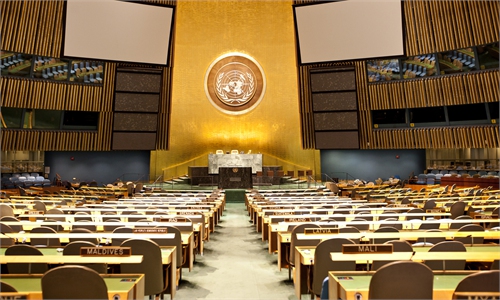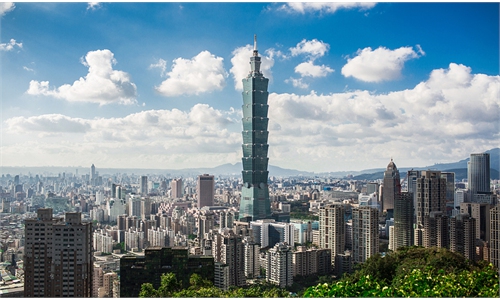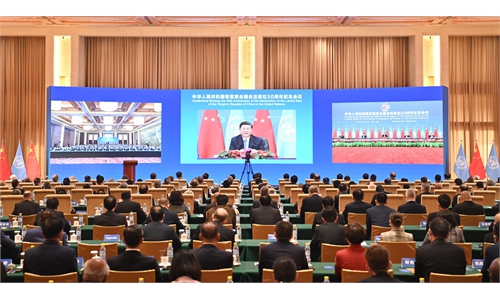
Delegates cheered when the 26th UN General Assembly passed the resolution to restore the lawful rights of the People's Republic of China in the UN on October 25, 1971. Photo: Xinhua
Fifty years ago, on October 25, 1971, the lawful rights of the People's Republic of China were officially restored in the United Nations, breaking through the West's diplomatic isolation. Among the 76 votes in favor of China, 26 were cast by African countries, while 11 of the 23 sponsors of the draft resolution were from Africa. Many newly independent African countries stood firmly on the side of the one-China principle in spite of the obstruction from the United States and other Western countries. Their courage stems from China-Africa friendship that has developed during the joint struggle against imperialism and colonialism.
For southern African countries, October 25 is also a special day. In 2019, the 39th Southern African Development Community summit designated this day as "Anti-Sanctions Day" to show solidarity with Zimbabwe, which has long suffered from illegal sanctions imposed by the West. Back in August 2001, the US Senate passed the so-called Zimbabwe Democracy and Economic Recovery Act. The following year, the US government unilaterally imposed sanctions on Zimbabwe without the UN authorization. Up until now, the unjustified suppression of Zimbabwe by the US and some Western countries and organizations has lasted for 20 years. China, together with African countries, has repeatedly called for the lifting of illegal sanctions against Zimbabwe. But Washington and other Western capitals have simply ignored this.
For two decades, the people of Zimbabwe have been under the Western sanctions. These have thwarted their efforts to improve the country's business environment and people's livelihood. It is conservatively estimated that illegal sanctions have cost Zimbabwe more than $40 billion in economic losses. We might as well paraphrase Victor Hugo's soul-touching question to the British and French allied forces that invaded China: The US and other Western countries consider themselves democratic countries, and Zimbabwe undemocratic. Is this what "democratic countries" should do to "undemocratic countries"?
The suffering of Zimbabwe from illegal sanctions is not new to many other countries. Statistics show that, during the Trump administration alone, the US imposed more than 3,900 sanctions. This was an average of three sanctions each and every day. The Chinese people feel the pain even more acutely. During the initial period since the founding of the PRC in 1949, the US and other Western countries have adopted a hostile policy of military blockade, trade embargo and political isolation. In recent years, the US has been recklessly suppressing China on all fronts in the vain hope that the Chinese people will give in under pressure.
Yet the wheel of history rolls forward. Bullying by a few major powers can lead up to nowhere. Chairman Mao Zedong once said that our cause is a just one. No enemy can break a just cause. China and African countries, including Zimbabwe, have been supporting each other. They have jointly opposed external interference and embarked on a path of independent development. Facts proved that sanctions cannot crush China. Nor can it frighten the African people. Any external pressure is nothing but a "paper tiger" that will only help people with conscience discern the ugly face of political interference. It will only bring the Chinese and African people closer together in times of wind and rain.
Currently, the world is at a new crossroads as great changes and the pandemic become intertwined at a once-in-a-century moment. More than ever before, the international community needs to join hands to address challenges and achieve common development. Some people in the West often talk about "rules." But they are in fact imposing rules unilaterally set by a few Western countries on the entire international community.
Such a trick runs counter to the international system with the United Nations at its core and to the basic norms of international relations based on the purposes and principles of the UN Charter. The new era does not welcome the Cold War mentality, nor accept hegemony and domination. Some countries are used to being "teachers." This is a bad habit that should be changed!
Both China and Africa used to be colonized ̶ partially, in China's case ̶ and oppressed by Western powers in the past. We both fought for liberation and independence. We both cherish the ardent desire for a better life. It is precisely because of these shared similarities that China and Africa have become natural allies, and a community with a shared future.
We are committed to multilateralism, abandoning institutional prejudices and ideological barriers, and upholding the common values of peace, development, equity, justice, democracy and freedom.
The journey ahead of us is still far. Yet as long as we remain united like pomegranate seeds, no matter what we face, China will always stand with African countries. Victory will belong to fairness and justice and to the China-Africa community.
Fifty years ago, we supported our brothers and sisters in Asia, Africa and Latin America in their struggles for national independence. In turn, these developing countries helped us back to the United Nations. Today, we are still ready to join hands with all the progressive forces in the world and continue to make unremitting efforts for the lofty cause of peace and development of mankind.
The author is an observer on current affairs. opinion@globaltimes.com.cn



